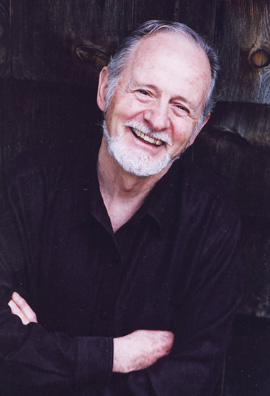Frost Wind Ensemble provides polished advocacy for music of Colgrass

The Frost Wind Ensemble performed music of Michael Colgrass Tuesday night at Festival Miami.
The Pulitzer Prize-winning composer Michael Colgrass was the star Tuesday night at Festival Miami as the Frost Wind Ensemble gave a performance of his exotic, evocative works.
Colgrass, who grew up in the United States but now lives in Toronto, seems to draw on 300 years of music for his musical vocabulary, with moments of Bach-like choral writing amid wildly contemporary jazz riffs.
The is extremely demanding music for an ensemble made up overwhelmingly of students, but the Frost Wind Ensemble had clearly been rehearsed to the hilt and the young musicians handled the music with tremendous polish and finesse. The ensemble was conducted by Gary Green, chair of the department of instrumental performance and director of bands for the Frost School.
Colgrass attended the Gusman Hall concert, where he took preconcert questions and stood for applause afterwards. One question revealed that he had not been particularly enthusiastic about composing for wind ensemble at first, believing that a wind ensemble was a lot like a brass band, with all the thickness and heaviness that such an ensemble represented.
Winds of Nagual, a 1985 work, is based on Carlos Castaneda’s tales of encounters with the shamanism of the Indians of Mexico. For all its complex rhythms and dissonances, this music had a classic, epic quality like Scheherazade, where an exotic culture is portrayed through a classical vocabulary. There were long, romantic solos for trumpet and flute, periods of shimmering unreality that seemed to suggest altered states of consciousness and moments of humor. The Frost musicians got into the spirit of each section, handling the rapid sections and swift changes of mood with no apparent difficulty.
Colgrass’ Urban Requiem, a 1995 work commissioned by the Frost School, uses a quartet of saxophones — soprano, alto, tenor and baritone — to create a tone of urban melancholy. The work opens with a gorgeous, Bach-like chorale for the saxophones, played with lustrous tones by soloists George Weremchuk, Dale Underwood, Gary Keller and Lynn Klock. It proceeds through evocations of street scenes, moments of nighttime contemplation, a wild, improvisatory solo by Keller on the tenor sax and a lyric, wistful solo by Weremchuk on the soprano sax. At various points in the music, one or another members of the Frost Wind Ensemble stood and ably partnered with one of the saxophones in duets.
The concert opened with A Piazzolla Trilogy, an arrangement by J.D. Shaw of three works of the Argentine tango king Astor Piazzolla. Most notable was the solo by Craig Morris on a bizarre-looking, tubular wind instrument that had audience members — at least those unfamiliar with that sort of instrument — asking each other what it was. It was an electronic wind instrument, or EWI (pronounced ee-wee), and with it Morris produced a sleek, silky sound somewhere between that of a saxophone and a clarinet, as he gave a warm, throbbing account of Piazzolla’s long, darkly colored melodies.
The next classical concert at Festival Miami is an all-Liszt performance by the pianist Jerome Lowenthal Saturday at 8 p.m. festivalmiami.com, 305-284-4940
Posted in Performances
Leave a Comment
Wed Oct 19, 2011
at 11:50 am
No Comments




